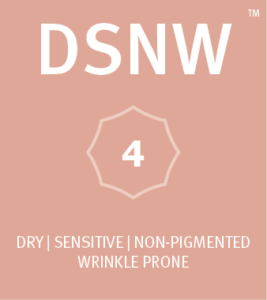Baumann Skin Type® DSNW: What You Need to Know

DSNW is one of the most complex Baumann Skin Types because it has several factors that must be taken into consideration when choosing skincare. The DSNW skin type is characterized by inflammation manifested as either pimples, redness, stinging or rashes. Some people experience 2 or more of these simultaneously. The inflammation leads to an increased risk of skin aging which makes it mandatory for this skin type to use anti-inflammatory and antioxidant ingredients. DSNW’s have an impaired skin barrier which means that allergens, bacteria and irritants can more easily enter the skin and water evaporates off of the skin leaving it dry.
DSNW skin is challenging, but knowing the proper skincare products to use on your skin will have a big impact on how your skin looks and feels. Consistent everyday use of the correct products will allow your skin to repair itself, hold onto water and reduce its tendency for inflammation.
What Is the DSNW Skin Type?

The DSNW skin type is Dry, Sensitive, Non-Pigmented and Wrinkle-Prone. Your skin’s defenses against allergens, irritants, bacteria and water loss is lower than other skin types. These underlying issues in addition to lifestyle habits give you an increased tendency to develop wrinkles. Anti-aging products are often drying and irritating which contribute to more inflammation and skin aging. If you have ever tried and anti-aging product and developed a rash or reaction, this is why. The first priority for your skin type is to reduce inflammation and hydrate the skin. Once this is accomplished, anti-aging ingredients can be slowly introduced into your regimen.
The Most Common Problems for DSNW Skin Types
With DSNW skin, the following skin concerns are very common:
- Dryness
- Scaling and flaking
- Lack of radiance (poor light reflection)
- Redness
- Burning or stinging
- Irritation
- Acne
- Rosacea
- Contact Dermatitis
- Broken blood vessels
- Wrinkles
- Thin, fragile skin
Inflammation/ Sensitivity
DSNWs suffer from inflammation. Inflammation is a result of activation of many different molecular pathways and genes. To make it easier to understand, I like to say that inflammation is caused by the character INFLA-MAN™. When INFLA-MAN causes inflammation, it can be in the form of acne, rosacea, sensation of stinging on the skin or skin allergies. Some DSNWs suffer from more than one of these. Your doctor can use prescription medication, lasers and lights to improve your skin’s symptoms by neutralizing INFLA-MAN. The sooner you start fighting INFLA-MAN the better because inflammation can progressively worsen if left untreated.
Impaired skin barrier
The “skin barrier” is a bilayer membrane made of lipids that surrounds your skin cells protecting them and making them water tight. The three main components of a well-functioning skin barrier are cholesterol, fatty acids and ceramides. These are all types of fat (lipid) molecules that must be present in the epidermis in order for the skin barrier to function properly. Dry skin types are missing one or more of these types of lipids. The best moisturizers for dry skin are barrier repair moisturizers that repair the skin barrier, allowing the skin to protect itself from outside insults such as allergens and dry climates. DSNWs should use a barrier repair moisturizer twice a day- especially in dry, cold climates.
Skin Aging
Skin aging occurs when various insults such as free radicals, pollution, radiation (UV light), heat (infrared light) cause breakdown of important cellular components. DSNWs are particularly susceptible because they have underlying inflammation that leads to the production of free radicals. An addition of antioxidants to the skincare regimen is one way to help lessen the risk of skin aging.
Dos and Don’ts for DSNW Skin
DO:
- Use barrier repair moisturizers such as those with MLE Technology
- Only use a retinoid every third day, and apply on top of your moisturizer
- Use products with anti-inflammatory ingredients such as argan oil, niacinamide and grape seed extract
- Wash your face after rinsing out hair conditioner to remove any residue from skin
- Use a sunscreen every day of at least SPF 15
- Consider taking an oral anti-inflammatory supplement, or eat foods with flaxseed oil, omega-3 fatty acids or zinc
- Eat foods high in linoleic acid, such as flax seeds, pumpkin seeds and walnuts
- Eat foods high in vitamin A, such as sweet potatoes, kale and carrots
- Get at least 7 hours of sleep a night
- Do one hour of any stress-relieving activity each day to lower blood cortisol levels
- Find a regimen that works and stick with it
DO NOT:
- Use foaming cleansers, shampoos and bubble baths with detergents like sodium lauryl sulfate
- Forget your daily sunscreen
- Get discouraged if it takes a few months for your skin to improve
- Use products not specified as appropriate for your skin type
- Eat a lot of sugar and dairy if you experience acne breakouts
- Experiment with new products
Caring for DSNW Skin
For DSNWs, the keys to a successful skincare routine are neutralizing INFLA-MAN and reinforcing the skin’s barrier. You should moisturize at least twice daily and avoid exfoliating scrubs, harsh ingredients and foaming cleansers that can worsen your skin’s condition. Click here to see my current favorite products for your skin type. Here are a few important tips to remember when caring for your DSNW skin:
- Cleanse with a gentle hydrating face wash. I like VMV Hypoallergenic Moisture Rich Creammmy Cleansing Milk.
- Never use a toner as these products contain drying ingredients that strip away the skin’s natural oils.
- Use anti-inflammatory or soothing products. I recommend PAORR 100% Organic Moroccan Argan Oil (available through Skin Type Solutions Physician Partners) because it provides hydration, soothing and antioxidants all at the same time.
- Moisturize, moisturize, moisturize. DSNW types should moisturize at least twice daily, although you can always apply more when your skin is especially dry or when you’re dealing with a very dry environment. During the day, use a moisturizer plus an SPF to ensure you’re getting the vital sun protection you need. In the evening, you can use a heavier nourishing cream. I like Zerafite Barrier Repair Moisturizer.
Dr. Baumann’s Bottom Line
Don’t get discouraged by your DSNW skin. Admittedly, this is one of the most difficult of the 16 Baumann Skin Types to manage, but it is by no means impossible to still have happy, healthy skin. The key is to know which skincare ingredients to include more of and which to avoid to help protect and strengthen your skin’s barrier and keep your skin hydrated.
If you’re not sure which Baumann Skin Type you have, or if you’d like more information about how to find the right products for your skin, visit www.skintypesolutions.com.
Dr. Leslie Baumann, M.D. and her team at Baumann Cosmetic Dermatology believe in proof, not promises. World-recognized for both cosmetic and general dermatology, our treatment strategies rely exclusively on evidence-based, scientifically verified products and procedures that promote skin health and a natural appearance. We combine effective medical procedures with individualized instruction on proper skincare, nutrition, supplementation and lifestyle in order to maximize the health of the skin and body as a whole while minimizing the effects of aging. For more, visit Dr. Baumann’s blog for daily updates Monday through Friday, or inquire about an appointment through Derm.net.



